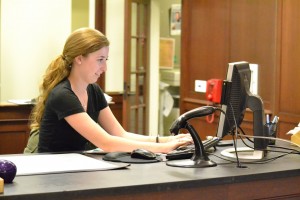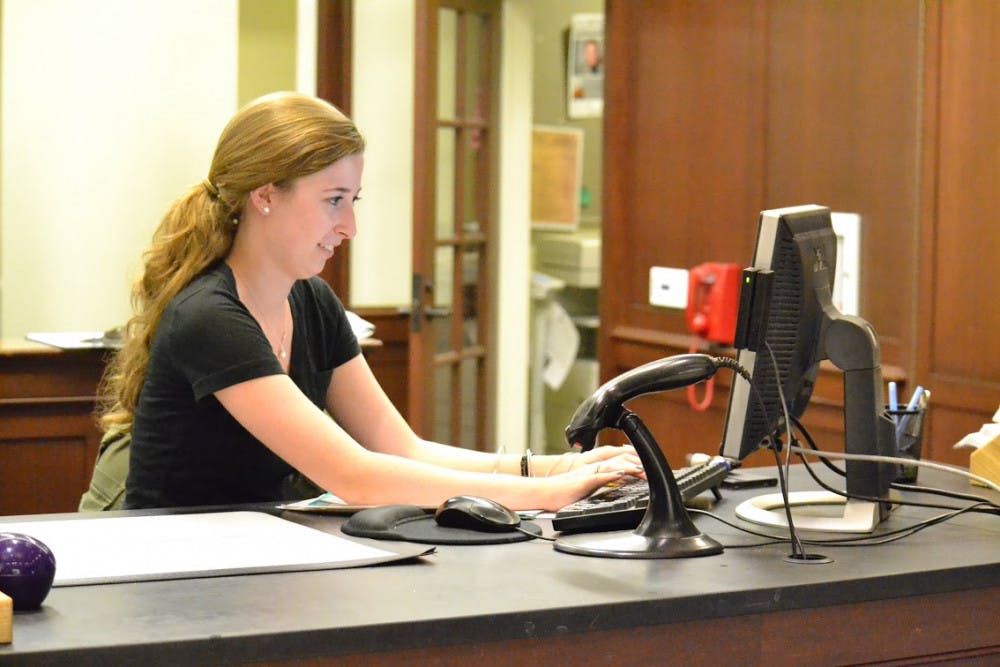By Colleen Murphy Managing Editor
Senior health and exercise science major Victoria Kerr knew she wanted to have a job while in college. So while she was getting ready to attend the College four years ago, she applied to several on-campus jobs.
One of the jobs she applied to was to be a box office cashier for the Center for the Arts. The employer emailed Kerr asking to have an interview and a few days after they spoke, Kerr heard back from the Center of the Arts — she had gotten the job.
For four years now, Kerr has sold tickets to students, faculty, staff and the public for concerts and dances; handled the phone and answered any questions that patrons might have had, either in the Don Evans Black Box Theater, Mildred and Ernest E. Mayo Concert Hall or Kendall Hall Main Stage Theater.
“I enjoy dealing with the public,” Kerr said. “Our events can generate large crowds which sometimes proves to be a challenge, but usually everything comes together nicely by the end of the night, and patrons are satisfied with their experience.”

Kerr is one of the more than 1,100 student workers that the College employs each year, and according to Student Employment Coordinator Vilja Casey, the work that all those students do is integral to running the College.
“Without many of the student workers, the positions would have to be filled with full-time workers,” Casey said, pointing out that the number of students employed by the school is probably larger than the College’s full-time employee payroll. “They’re very important to the running of the institution. We are very proud of our student workers. They do such a good job.”
While a great deal of students would like to have an on-campus job, and thus, have a role in helping to keep the College running smoothly, the reality is that many of them who apply for employment at the school will not receive it. The hiring process for student employment is a competitive one, especially for entry level jobs. In fact, office assistants — the most sought after position at the College — can receive anywhere from 200 to 300 applications for one open position, Casey said.
According to Casey, office assistant positions are the first to fill up because they do not require specific skills, such as knowing another language if you are an oral proficiency hour leader, or knowing how to save someone from drowning if you work as lifeguard.
A job’s skill level dictates how much a student earns, Casey said. Entry level jobs pay the minimum wage, which is currently $8.38, and then there are three more pay levels of $9.25, $10.25 and $11.25.
While there are about 1,100 student workers getting paid by the College and another 168 getting paid through federal work study grants, there are actually 1,400 on-campus student jobs, according to Casey. This difference of roughly 100 student employees from the positions available is due to the fact that students can work more than one job.
According to Casey, the College does not have a limit on the number of jobs a student can hold. They do, however, cap the number of hours a student can work at all of their jobs, combined, at 15 hours a week. This is to make up for the fact that some jobs only call for an hour or two of work per week. And as Casey pointed out, there have been reports conducted by the National Survey of Student Engagement that working 15 hours a week while in college can positively impact students’ grades.
Getting hired to even at least one job, again, is a competitive process, and Casey recommends that students apply to as many jobs as for which they deem themselves qualified. Still, Casey said that she has had students apply for over 20 jobs and who have not heard anything back from any of the potential employers.
Casey recognizes this lack of response as something that can be improved upon and says that she does encourage the employers to inform students of their application status.
“I feel bad when (students) come to me and say, ‘How long should I wait?’ Well, you haven’t received a letter or a phone call by now, then probably you didn’t get the job. And I hope that a student who has been interviewed and didn’t get the job, (is told by a) student employer that they didn’t get the job,” Casey said. “That’s also a part of the real world — very often they don’t answer you unless you got the job. It’s kind of a real-world experience.”
In fact, according to a study conducted in 2013 by CareerBuilder.com, a website for job searching, among 3,991 employees included in the survey, 60 percent said they don’t hear back from a potential employer after an interview.
Still, the College recognizes that students are not yet in the “real-world,” and so departments are reminded to reply to their applicants if it is feasible. For example, it would be virtually impossible to send a personalized note to all 200 applicants for an office assistant job.
“This is a college campus, (employers) know this is a learning experience,” Casey said.
Junior psychology major Caitlin Nehila applied to almost 20 jobs during the summer coming into her freshman year. She did not hear back from any of the positions and believes that receiving constructive feedback would actually have been a greater learning experience.
“If I applied for something and they don’t like me they could at least say what I could do to improve my application,” Nehila said. “Not hearing anything back deters me from applying to any more jobs.”
Nehila also suggested that capping the number of applicants to a job might make for a more efficient, fair system. If no student in the first batch of applicants fit the bill for the employers, the position can be reopened on the online portal. This, she said, would save students’ and employers’ time.
Apart from the potential benefit of a higher GPA that working while in college has proven to provide, Casey says that the networking, sense of being involved on campus and résumé boost are also important factors to consider when deciding whether to apply for or accept an on-campus job.
“There are some students who never really worked in high school, and we encourage them to get an on-campus job because you need something on your résumé other than great grades,” Casey said.
The number of jobs available at any one time varies greatly. According to Casey, there were about 80 positions listed at the beginning of the academic school year. As of Monday, Oct. 26, there were 17 job openings to students, and Casey recommends that students apply because of all the benefits that working can have for them.
Kerr agrees with this, saying that having her cashier job has benefited her future self.
“Working on campus has taught me a lot of skills and given me years of experience,” Kerr said. “...Without a doubt, a lot of the experience I gained will be useful in future endeavors after I graduate from TCNJ.”







